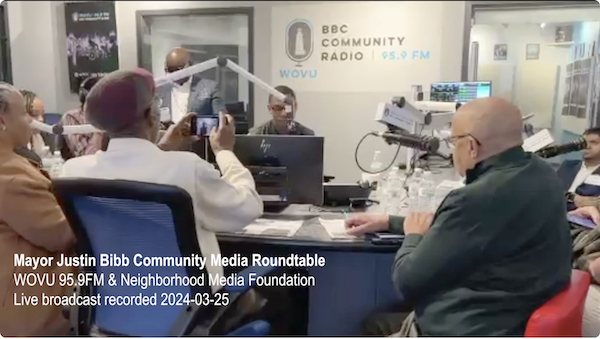Back on March 22 of this year I asked Cleveland mayor Justin Bibb if he had ever contemplated what the city could do redirecting the millions of public dollars [facility maintenance, construction, police protection, etc.] it spent annually on providing a home for the Cleveland Browns pro football team.
“I haven't thought about it,” came the swift reply.
What the mayor did not say was that the city cannot afford to keep all three teams.
That of course is the elephant in the room. …
For the Haslams, of course, it is all about the $Benjamin$.
Having already said earlier in the discussion — he was meeting with about 15 or so members or aspirants of the Neighborhood and Community Media Association at community radio station WOVU-FM — that he could not discuss the ongoing lease renewal discussions with the Browns' ownership, the mayor offered a litany of reasons why he couldn’t consider letting the Browns go. He suggested that having three major sports teams in the urban core gave the city a competitive advantage; the Browns were a key part of the civic fabric. While he noted Cleveland’s substantial population and job losses over the past few decades, he nonetheless expressed a “belief and hope” that all three teams could remain. He talked about the need for the city to have an economic strategy that would make Cleveland globally competitive and suggested that a major transformation of the lakefront would be part of that strategy.
Q&A re Browns location runs starts about 26:20 and runs five minutes.
What the mayor did not say was that the city cannot afford to keep all three teams.
That of course is the elephant in the room.
The likelihood of the Browns leaving town when their lease expires in 2028 was already verging towards probability back in March. As we continued to interrogate the issue it became ever harder to see the Browns consenting to remaining inside the city limits.
Even before the Bibb administration dropped one very large shoe yesterday, we were certain, based on several sources close to both the city and the team, that owners Jimmy and Dee Haslam intended to move the team to the suburbs.
It is a virtual certainty that the second shoe will drop before the city’s requested August 12 deadline for a response to its $461 million offer made public yesterday.
What appears to be going on now is a carefully choreographed routine by which the city will appear to have done its best, and the Haslams will find it insufficient, but state their rejection in a way that burns as few bridges as possible.
The logics for the Haslams to leave the lakefront for more pristine premises that they control are abundantly clear. Controlling the land, the parking, the concessions, and all the ancillary revenue opportunities that come from having complete site control makes the Haslams move to Brook Park a no-brainer with or without a dome. It’s essentially the same model that fueled the fortune they made through the Pilot J truck stop franchise.
Other National Football League teams [see the Patriots and Cowboys, among others] have already developed the blueprint and it is clearly the wave of the future.
For the Haslams, of course, it is all about the Benjamins, notwithstanding their posturing about doing “what’s best for our fans”. Owning the Browns has become their livelihood and is already a billion-dollar investment. That asset will only grow when they have greatly expanded their revenue streams once they exercise their option on the 176-acre parcel in Brook Park and receive whatever goodies Gov. DeWine is going to send their way.
Public Reaction
The public outcry when the Haslams reject the city’s offer and announce plans to move to greener pastures will be enormous. Fans will bemoan the “loss” of their team and the Haslams’s “betrayal” as if the team was moving to Baltimore or Indianapolis or Las Vegas instead of just down the road. City council people will stick fingers in the air to try and get ahead of their constituents. Local news stations will send crews to capture b-roll film of whichever villains are going to be burned in effigy.
All of this is likely to unfold quickly. The Browns’ first exhibition game is August 10 and the Haslams will not want public angst to cloud a promising season. They likely calculate a good season by the team will swiftly dampen public outcry over the team’s future departure, and that fans will realize the team is merely upscaling to a bigger, better house just down the road.
The political fallout will be longer lasting and harder to predict. The mayor will stand for re-election next year. He has no clear opposition, but downtown business interests can always find someone to do their bidding. The politics will be complicated by the fact that next year will also see city council shrinking from 17 seats to 15.
If the Bibb administration wasn’t thinking five months ago about a future unencumbered by an expensive albatross that sits idle on a large parcel of valuable lakefront land about 355 days every year, you can bet your bottom dollar it is top of mind today.
• • •• • •













